Darkest Hour Read online
Page 5
This is what I was thinking as I explained about retreats. It was what I was thinking as I went on to explain what I knew about the Vietnam War, and then the eventual fall of communism in the former Soviet Union. It was what I was thinking as I brushed my teeth and got ready for bed. It was what I was thinking as I said good night to him and crawled under the covers and turned out the light. It was what I was thinking as sleep overcame me and blissfully blotted out all thought whatsoever…the time I spend sleeping being the only time, lately, when I can escape thoughts of Jesse.
But let me tell you, it came back in full force when, just a few hours later, I woke with a start to find a hand pressed over my mouth.
And, oh yeah, a knife held to my throat.
chapter
four
Being a mediator, I am not unaccustomed to being woken in, shall we say, a less than gentle manner.
But this was a lot less gentle than usual. I mean, usually when someone wants your help, they go out of their way not to antagonize you …which waving a knife around has a tendency to do.
But as soon as I opened my eyes and saw who this knife-wielding individual was, I realized that probably what she wanted was not my help. No, probably what she wanted was to kill me.
Don’t ask me how I knew. Undoubtedly those old mediator instincts at work.
Well and the knife was a pretty significant indicator.
“Listen to me, you stupid girl,” Maria de Silva hissed at me. Maria de Silva Diego, I should say, since at the time of her death, she was married to Felix Diego, the slave-runner. I know all this from that book Doc got out of the library called My Monterey, a history of Salinas County from 1800 to 1850. There’d even been that portrait of Maria in it.
Which was how I happened to know who was trying to kill me this time.
“If,” Maria hissed, “you don’t get your father and brother to stop digging that hole”—um, step- father and stepbrother, I wanted to correct her, only I couldn’t, on account of the hand over my mouth—“I’ll make you sorry you were ever born. Got that?”
Pretty tough talk from a girl in a hoopskirt. Because that’s what she was. A girl.
She hadn’t been when she’d died. When she had died, around the turn of the century—last century, of course, not this one—Maria de Silva Diego had been around seventy or so.
But the ghost on top of me appeared to be my own age. Her hair was black, without a hint of gray, and she wore it in these very fancy ringlets on either side of her face. She appeared to have a lot going on in the jewelry department. There was this big fat ruby hanging from a gold chain around her long, slender neck—very Titanic and all—and she had some heavy-duty rings on her fingers. One of them was cutting into my gums.
That’s the thing about ghosts, though—the thing that they always get wrong in the movies. When you die, your spirit does not take on the form your body had at the moment you croaked. You just don’t ever see ghosts walking around with their guts spilling out, or their severed head in their hands, or whatever. If you did, Jack might have been justified in being such a little scaredy-cat.
But it doesn’t happen that way. Instead, your ghost appears in the form your body had when you were at your most vital, your most alive.
And I guess for Maria de Silva, that was when she was sixteen or so.
Hey, it was nice she had an option, you know? Jesse hadn’t been allowed to live long enough to have much of a choice. Thanks to her.
“Oh, no, you don’t,” Maria said, the backs of her rings scraping against my teeth in a manner I would really have to describe as unpleasant. “Don’t even think about it.”
I don’t know how she’d known, but I had been considering ramming my knees into her spine. The knife blade pressing against my jugular soon dissuaded me from that plan, however.
“You’re going to make your father stop digging back there, and you’re going to destroy those letters, understand, little girl?” Maria hissed. “And you aren’t going to say a word about them—or me—to Hector. Am I making myself clear?”
What could I do? She had a knife to my throat. And there was nothing in her manner at all reminiscent of the Maria de Silva who’d written those idiotic letters. This chick was not gushing about her new bonnet, if you get my drift. I hadn’t any doubt at all that she not only knew how to use that knife, but that she fully intended to do so, if provoked.
I nodded to show her that I was perfectly willing, under the circumstances, to follow her orders.
“Good,” Maria de Silva said. And then she lifted her fingers from my mouth. I could taste blood.
She had straddled me—which accounted for all the lacy petticoat in my face, tickling my nose—and now she looked down at me, her pretty features twisted into an expression of disgust.
“And they said for me to look out,” she sneered. “That you were a tricky one. But you aren’t so tricky, are you? You’re just a girl. A stupid little girl.”
She threw back her head and laughed.
And then she was gone. Just like that.
As soon as I felt like I could move again, I got out of bed and went into my bathroom, where I turned on the light and looked at my reflection in the mirror above my sink.
No. It hadn’t been a nightmare. There was blood between my teeth where Maria de Silva’s ring had cut into me.
I rinsed until all the blood was gone, then turned off the bathroom light and came back into my room. I think I was in a daze or something. I couldn’t quite register what had just happened. Maria de Silva. Maria de Silva, Jesse’s fiancée—I think it would be safe to say ex-fiancée, under the circumstances—had just appeared in my room and threatened me. Me. Sweet little old me.
It was a lot to process, especially considering it was, oh, I don’t know, four in the morning?
And yet it turned out I was in for yet another late-night shock. No sooner had I stepped from the bathroom than I noticed someone was leaning against one of the posts to the canopy over my bed.
Only it wasn’t just someone, it was Jesse. And when he saw me, he straightened up.
“Are you all right?” he asked worriedly. “I thought I…Susannah, was somebody just here?”
Uh, your knife-wielding ex-girlfriend, you mean?
That’s what I thought. What I said was, “No.”
Okay. Don’t start with me. The reason I didn’t tell him had nothing to do with Maria’s threat.
No, it was the other thing Maria had said. About telling Andy to quit digging in the backyard. Because that could mean only one thing: that there was something buried in the backyard Maria didn’t want anybody to find.
And I had a feeling I knew what that something was.
I also had a feeling that that something was the reason Jesse had been hanging around the Carmel Hills for so long.
I should have blurted this all out to Jesse, right? I mean, come on: He had a right to know. It was something that very directly concerned him.
But it was also something that, I was fairly sure, was going to take him away from me forever.
Yeah, I know: If I really loved him, I’d have been willing to set him free, like in that poem that’s always on those posters with the seagulls flying in the wind: If you love something, set it free. If it was meant to be, it will come back to you.
Let me tell you something. That poem is stupid, all right? And it so totally does not apply in this situation. Because once Jesse gets set free, he is never coming back to me. Because he won’t be able to. Because he’ll be in heaven, or another life, or whatever.
And then I’ll have to become a nun.
God. God, everything sucks.
I crawled back into bed.
“Look, Jesse,” I said, pulling the covers up to my chin. I had on a T-shirt and boxers, but, you know, no bra or anything. Not that he could tell, in the dark and all, but you never know. “I’m really tired.”
“Oh,” he said. “Of course. But…You’re sure there wasn’t anyone in here?
Because I could swear I—”
I waited expectantly for him to finish. Just how would he end that sentence? I could swear I heard the sweet dulcet tones of the woman I once loved? I could swear I smelled her perfume—which, by the way, was of orange blossoms?
But he didn’t say either of those things. Instead, looking really confused, he said, “Sorry,” and disappeared, exactly the way his ex-girlfriend had disappeared. In fact, you’d think they might have run into each other, wouldn’t you, out there on the spiritual plane, with all of this materializing and dematerializing?
But apparently not.
I won’t lie and tell you that I dropped back off to sleep right away. I didn’t. I was really, really tired, but my mind just kept repeating what Maria had said, over and over. What on earth was she so hot and bothered about, anyway? Those letters didn’t have anything the least bit incriminating in them. I mean, if it’s true that she had Jesse iced so she could marry her boyfriend Diego instead of him.
And if those letters were so important, why hadn’t she had them destroyed properly all those years ago? Why were they buried in our backyard in a cigar tin?
But that wasn’t what was really bothering me. What really bothered me was the fact that she wanted me to get Andy to stop digging altogether. Because that could only mean one thing:
There was something even more incriminating back there.
Like a body.
And I didn’t even want to think about whose.
And when I woke up again a few hours later, after finally managing to nod off, I still didn’t want to think about it.
But one thing I did know: I was not going to ask Andy to stop digging (like he’d even listen to me if I did), nor was I going to destroy those letters. No freaking way.
In fact, I took personal possession of them, just in case, telling Andy that I’d deliver them to the historical society myself. I figured they’d be safe there, in case old Maria Diego got up to anything. Andy looked surprised, but not enough actually to ask me what I was up to. He was too busy yelling at Dopey for shoveling in the wrong place.
When I got to the Pebble Beach Hotel and Golf Resort that morning, it was to be greeted by Caitlin with an accusatory, “Well, I don’t know what you did to Jack Slater, but his family asked that you be assigned to watch him for the rest of their stay…until Sunday, actually.”
I wasn’t surprised. Nor did I mind, particularly. The Paul factor was troubling, of course, but now that I knew the reason behind Jack’s odd behavior, I genuinely liked the kid.
And he, it became clear the moment I set foot inside his family’s suite, was wild about me. No more lying on the floor in front of the TV for him. Jack was in his swimsuit and ready to go.
“Can you teach me the butterfly today, Suze?” he wanted to know. “I’ve always wanted to know how to do the butterfly.”
“Susan,” his mother said to me, in a whispered aside, right before she ran off to her hair appointment (neither Paul nor his father were around, much to my relief, having had a 7:00 tee time). “I can’t thank you enough for what you’ve done for Jack. I don’t know what you said to him yesterday, but he is like a different child. I have never seen him so happy. You know, he really is the most remarkably sensitive person. Such an imagination, too. Always thinking he’s seeing…well, dead people. Has he mentioned this to you?”
I said nonchalantly that he had.
“Well, we’ve been at our wits’ end. We must have had thirty different doctors look at him, and no one—no one—seemed able to get through to him. Then you came along, and…” Nancy Slater looked down at me with carefully made-up blue eyes. “Well, I don’t know how we’ll ever be able to thank you, Susan.”
You could start, I thought, by calling me by my right name. But I didn’t really care. I just said, “No problem, Mrs. Slater,” and went and got Jack and headed with him back to the pool.
Jack was like a different kid. There was no denying that. Even Sleepy, roused from his semipermanent doze by Jack’s happy splashing, asked me if that was the same boy he’d seen me with the morning before, and when I told him it was, actually looked incredulous for a second or two before going back to sleep. The things that had once frightened Jack—basically, everything—no longer seemed to bother him in the least.
And so when, after burgers at the Pool House, I suggested he and I take the hotel shuttle bus into town, he didn’t even protest. He even commented that the plan “sounded like fun.”
Fun. From Jack. Really, maybe mediating isn’t my calling at all. Maybe I should be a teacher, or a child psychologist, or something. Seriously.
Jack wasn’t particularly thrilled, however, when, once we got into town, we headed toward the building that houses the Carmel-by-the-Sea Historical Society. He wanted to go to the beach, but when I told him that it was to help a ghost and that we’d go to the beach afterward, he was okay with it.
I’m not really a historical society type of gal, but even I have to admit it was kind of cool, looking at all the old photos on the walls of the place, photos of Carmel and Salinas County a hundred years earlier, before all the strip malls and Safeways opened, when it was all just fields dotted with cypress trees, like in that book they made us read in the eighth grade, The Red Pony. They had some pretty cool stuff there—not much, really, from Jesse’s time, but a lot from later on, like after the Civil War. Jack and I were admiring something called a stereo viewer, which is what people used for entertainment before movies, when this untidy-looking bald man came out of his office and peered at us through glasses with lenses as thick as Coke bottle bottoms and said, “Yes, you wanted to see me?”
I said we wanted to see someone in charge. He said that was him, and introduced himself as Dr. Clive Clemmings, Ph.D. So I told Dr. Clive Clemmings, Ph.D., who I was and where I lived, and took the cigar tin from my JanSport backpack (Kate Spade really doesn’t go with pleat-front khaki shorts) and showed him the letters….
And he freaked out.
I mean it. He freaked out. He was so excited, he told the old lady at the reception desk to hold his calls (she looked up, astonished, from the romance novel she was reading; it was clear that Dr. Clive Clemmings, Ph.D., must not get many calls) and ushered Jack and me back into his private office….
Where I nearly had a coronary. Because there, above Clive Clemmings’s desk, was Maria de Silva’s portrait, the one I had seen in that book Doc had taken out of the library.
The painter had done, I realized, an extraordinarily good job. He’d gotten it completely right, down to the artfully ringleted hair and the gold-and-ruby necklace around her elegantly curved neck, not to mention her snooty expression….
“That’s her!” I cried, completely involuntarily, stabbing my finger at the painting.
Jack looked up at me as if I’d gone mental—which I suppose I momentarily had—but Clive Clemmings only glanced over his shoulder at the portrait and said, “Yes, Maria Diego. Quite the jewel in the crown of our collection, that painting. Rescued it from being sold at a garage sale by one of her grandchildren, can you imagine? Down on his luck, poor old fellow. Disgraceful, when you think about it. None of the Diegos ever amounted to much, however. You know what they say about bad blood. And Felix Diego—”
Dr. Clive had opened the cigar tin and, using some special tweezery-looking things, unfolded the first letter. “Oh, my,” he breathed, looking down at it.
“Yeah,” I said. “It’s from her.” I nodded up at the painting. “Maria de Silva. It’s a bunch of letters she wrote to Jesse—I mean, to Hector de Silva, her cousin, who she was supposed to marry, only he—”
“Disappeared.” Clive Clemmings stared at me. He had to be, if I guessed, in his thirties or so—despite the very wide spot of bare scalp along the top of his head—and though by no means attractive, he did not look so utterly repulsive just then as he had before. A look of total astonishment, which certainly does not become many, did wonders for him.
“My God,” he said. �
��Where did you find these?”
And so I told him again, and he got even more excited, and told us to wait in his office while he went and got something.
So we waited. Jack was very good while we did so. He only said, “When can we go to the beach already?” twice.
When Dr. Clive Clemmings, Ph.D., came back, he was holding a tray and a bunch of latex gloves, which he told us we had to put on if we were going to touch anything. Jack was pretty bored by that time, so he elected to go back out into the main room to play with the stereo viewer some more. Only I donned the gloves.
But was I glad I did. Because what Clive Clemmings let me touch when I had them on was everything the historical society had collected over the years that had anything whatsoever to do with Maria de Silva.
Which was, let me tell you, quite a lot.
But the things in the collection that most interested me were a tiny painting—a miniature, Clive Clemmings said it was called—of Jesse (or Hector de Silva, as Dr. Clive referred to him; apparently only Jesse’s immediate family ever called him Jesse…his family, and me, of course) and five letters, in much better condition than the ones from the cigar box.
The miniature was perfect, like a little photograph. People could really paint back in those days, I guess. It was totally Jesse. It captured him perfectly. He had on that look he gets when I’m telling him about some great conquest I had made at an outlet—you know, scoring a Prada handbag for fifty percent off, or something. Like he couldn’t care less.
In the painting, which was just of Jesse’s head and shoulders, he was wearing something Clive Clemmings called a cravat, which was supposedly something all the guys wore back then, this big frilly white thing that wrapped around the neck a few times. It would have looked ridiculous on Dopey or Sleepy or even Clive Clemmings, in spite of his Ph.D.

 Bridal Boot Camp
Bridal Boot Camp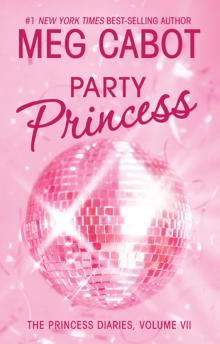 Party Princess
Party Princess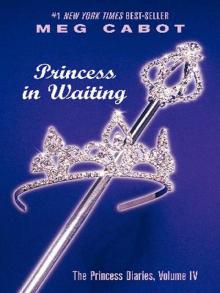 Princess in Waiting
Princess in Waiting Being Nikki
Being Nikki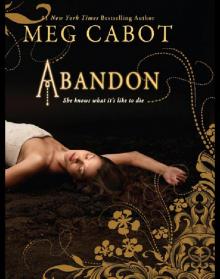 Abandon
Abandon Princess on the Brink
Princess on the Brink Darkest Hour
Darkest Hour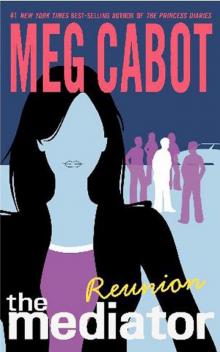 Reunion
Reunion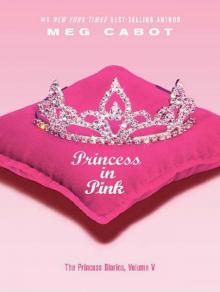 Princess in Pink
Princess in Pink Sweet Sixteen Princess
Sweet Sixteen Princess The Princess Diaries
The Princess Diaries Airhead
Airhead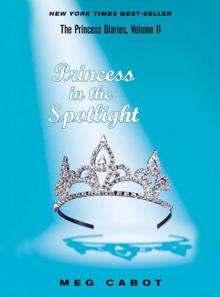 Princess in the Spotlight
Princess in the Spotlight No Judgments
No Judgments All-American Girl
All-American Girl Princess in Love
Princess in Love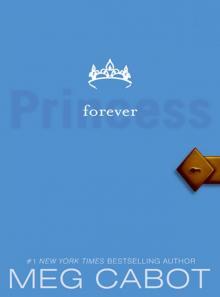 Forever Princess
Forever Princess Haunted
Haunted Shadowland
Shadowland Twilight
Twilight Princess Mia
Princess Mia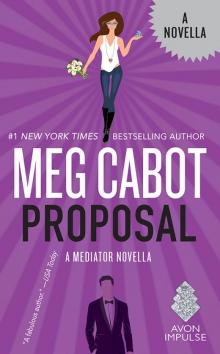 Proposal
Proposal Remembrance
Remembrance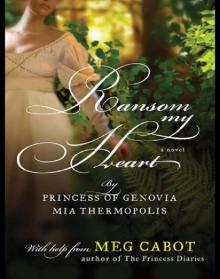 Ransom My Heart
Ransom My Heart Underworld
Underworld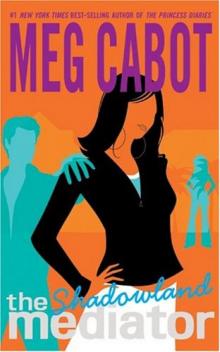 Shadowland tm-1
Shadowland tm-1 Size 14 Is Not Fat Either
Size 14 Is Not Fat Either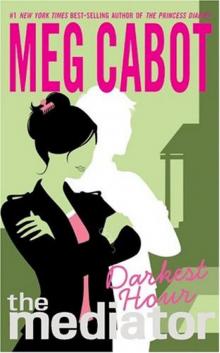 Darkest Hour tm-4
Darkest Hour tm-4 Airhead a-1
Airhead a-1 Royal Crush
Royal Crush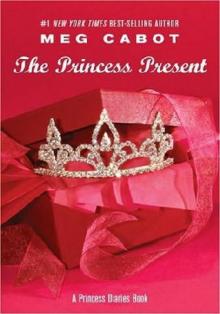 The Princess Present (princess diaries)
The Princess Present (princess diaries)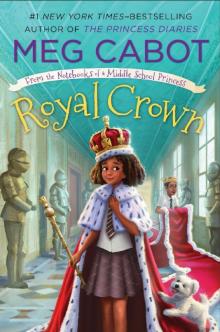 Royal Crown
Royal Crown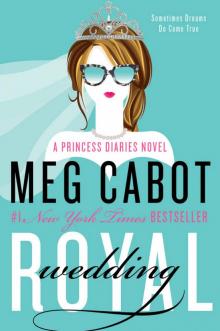 Royal Wedding: A Princess Diaries Novel (The Princess Diaries Book 11)
Royal Wedding: A Princess Diaries Novel (The Princess Diaries Book 11)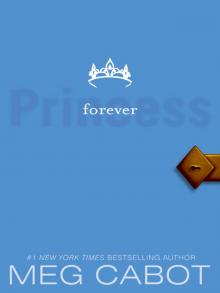 Princess Diaries, Vol. X: Forever Princess
Princess Diaries, Vol. X: Forever Princess Royal Wedding Disaster
Royal Wedding Disaster Allie Finkle's Rules for Girls: Glitter Girls and the Great Fake Out
Allie Finkle's Rules for Girls: Glitter Girls and the Great Fake Out Size 12 Is Not Fat hwm-1
Size 12 Is Not Fat hwm-1 Princess on the Brink pd-8
Princess on the Brink pd-8 The New Girl
The New Girl Allie Finkle's Rules for Girls: Moving Day
Allie Finkle's Rules for Girls: Moving Day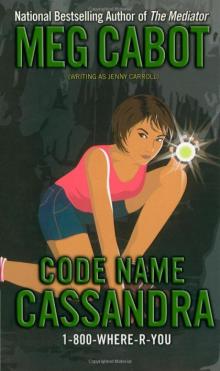 Code Name Cassandra
Code Name Cassandra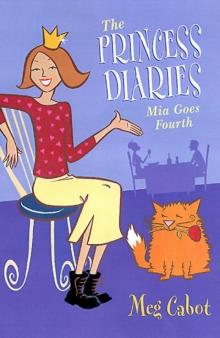 Mia Goes Fourth pd-4
Mia Goes Fourth pd-4 Sanctuary 1-4
Sanctuary 1-4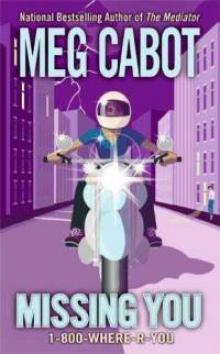 Missing You 1-5
Missing You 1-5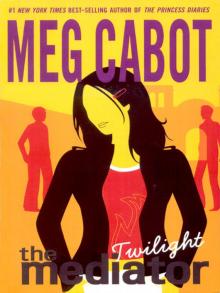 The Mediator 6: Twilight
The Mediator 6: Twilight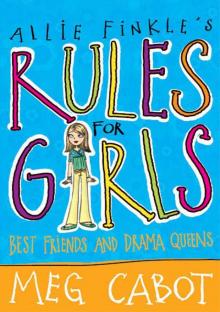 Allie Finkle's Rules for Girls: Best Friends and Drama Queens
Allie Finkle's Rules for Girls: Best Friends and Drama Queens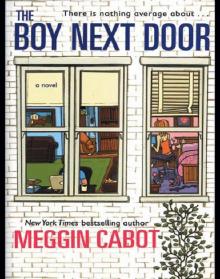 The Boy Next Door
The Boy Next Door Every Boy's Got One
Every Boy's Got One Princess Mia pd-9
Princess Mia pd-9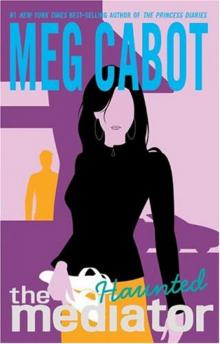 Haunted tm-5
Haunted tm-5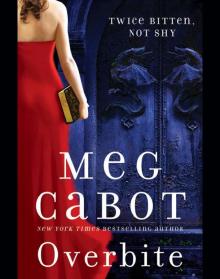 Overbite
Overbite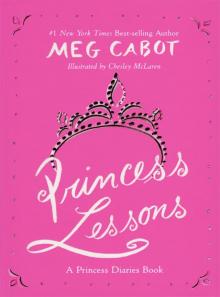 Princess Lessons
Princess Lessons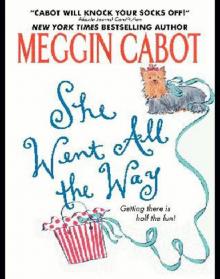 She Went All the Way
She Went All the Way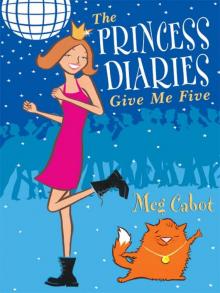 Give Me Five pd-5
Give Me Five pd-5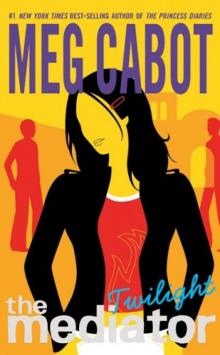 Twilight tm-6
Twilight tm-6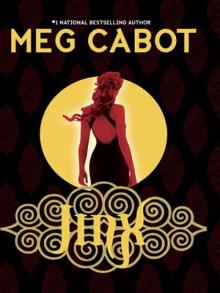 Jinx
Jinx Runaway (Airhead #3)
Runaway (Airhead #3) Queen of Babble Gets Hitched qob-3
Queen of Babble Gets Hitched qob-3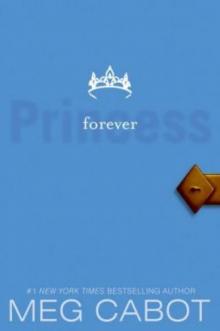 Forever Princess pd-10
Forever Princess pd-10 Queen of Babble
Queen of Babble Boy Meets Girl b-3
Boy Meets Girl b-3 Pants on Fire
Pants on Fire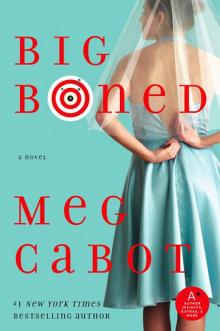 Big Boned ху-3
Big Boned ху-3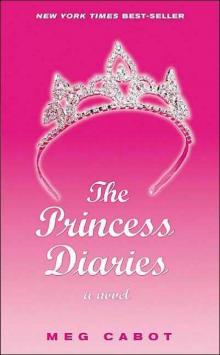 Princess' Diaries pd-1
Princess' Diaries pd-1 Size 14 Is Not Fat Either hwm-2
Size 14 Is Not Fat Either hwm-2 Awaken a-3
Awaken a-3 Queen Of Babble: In The Big City qob-2
Queen Of Babble: In The Big City qob-2 Nicola and the Viscount
Nicola and the Viscount Allie Finkle's Rules for Girls: Stage Fright
Allie Finkle's Rules for Girls: Stage Fright Size 12 and Ready to Rock
Size 12 and Ready to Rock Perfect Princess
Perfect Princess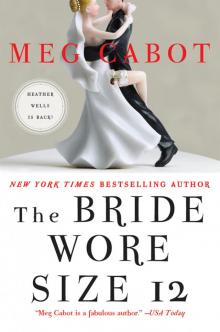 The Bride Wore Size 12
The Bride Wore Size 12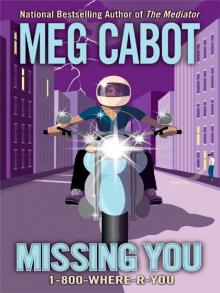 1-800-Where-R-You: Missing You
1-800-Where-R-You: Missing You How to Be Popular
How to Be Popular Queen of Babble Bundle with Bonus Material
Queen of Babble Bundle with Bonus Material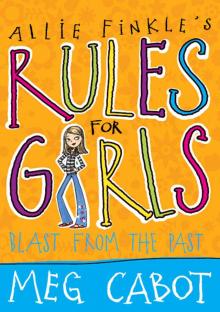 Allie Finkle's Rules for Girls: Blast from the Past
Allie Finkle's Rules for Girls: Blast from the Past Princess in the Spotlight pd-2
Princess in the Spotlight pd-2 Ready or Not
Ready or Not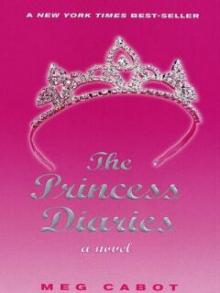 The Princess Diaries I
The Princess Diaries I Party Princess pd-7
Party Princess pd-7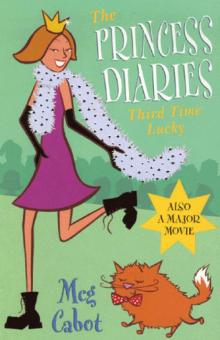 Third Time Lucky pd-3
Third Time Lucky pd-3 Stage Fright
Stage Fright From the Notebooks of a Middle School Princess
From the Notebooks of a Middle School Princess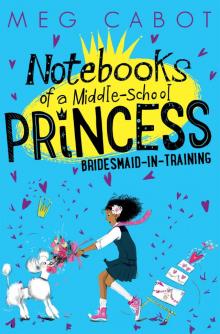 Notebooks of a Middle-School Princess Bridesmaid-in-Training
Notebooks of a Middle-School Princess Bridesmaid-in-Training Boy Meets Girl
Boy Meets Girl Missing You
Missing You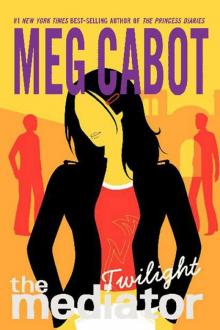 The Twilight
The Twilight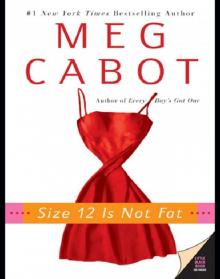 Size 12 Is Not Fat
Size 12 Is Not Fat Code Name Cassandra 1-2
Code Name Cassandra 1-2 Valentine Princess
Valentine Princess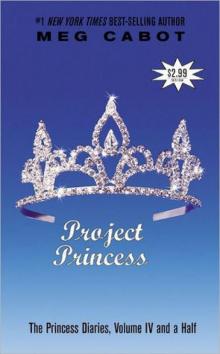 Project Princess
Project Princess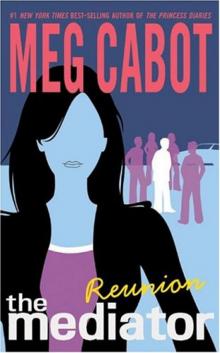 Reunion tm-3
Reunion tm-3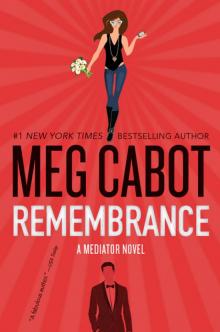 Remembrance: A Mediator Novel
Remembrance: A Mediator Novel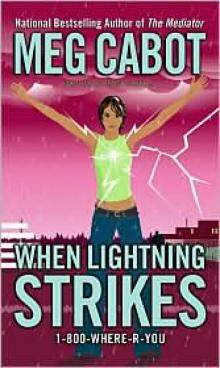 When Lightning Strikes 1-1
When Lightning Strikes 1-1 Safe House 1-3
Safe House 1-3 Teen Idol
Teen Idol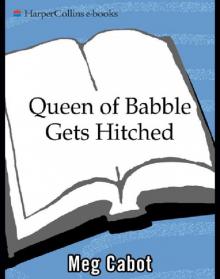 Queen of Babble Gets Hitched
Queen of Babble Gets Hitched Glitter Girls and the Great Fake Out
Glitter Girls and the Great Fake Out Moving Day
Moving Day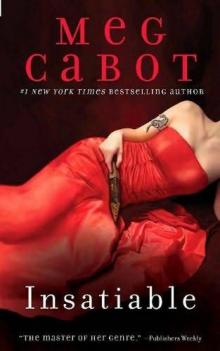 Insatiable
Insatiable All American Girl
All American Girl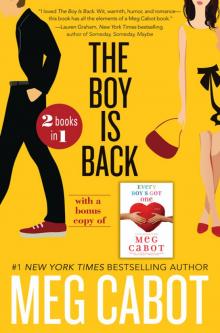 The Boy Is Back + Every Boy's Got One Bundle
The Boy Is Back + Every Boy's Got One Bundle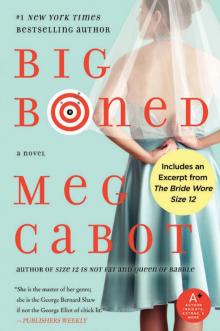 Big Boned
Big Boned Awaken
Awaken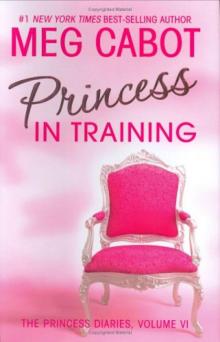 Princess in Training pd-6
Princess in Training pd-6